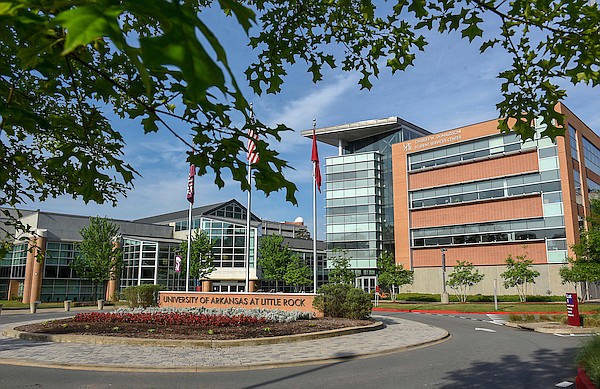The Emerging Threat Information Sharing and Analysis Center -- of which the University of Arkansas at Little Rock is a key member -- is expanding, thanks to a $1 million grant from the U.S. Department of Energy.
The grant, from the energy department's Office of Cyber Security, Energy Security, and Emergency Response, will help fight cyberattacks in the energy sector, according to Angie Faller, UALR news director. The grant will fortify the Forge Institute Emerging Threat Center and enable "purposeful collaboration to expand operational capabilities and enhance regional threat information sharing."
The Center's goals focus on increasing workforce development, creating education and training for securing energy sector control systems, and advancing cybersecurity threat intelligence sharing practices, according to Faller. The Center involves a consortium of universities, cybersecurity experts, electric utilities, and energy sector partners through the Cybersecurity Consortium for Innovation, led by the Forge Institute -- which is headquartered in Little Rock and focuses on advancing cyber capabilities through innovative partnerships across the public and private sectors.
The project provides services for utilities and power system operators throughout the region, including the Electric Cooperatives of Arkansas, Arkansas Public Power Utilities, National Rural Electric Cooperative Association, Entergy, Midwest ISO, and Southwest Power Pool.
"The energy sector, and electric utilities, in particular, are on the front lines when it comes to nation-state cybersecurity attacks," said Philip Huff, assistant professor of cybersecurity at UALR and principal investigator on this grant, in a news release from the university issued on Tuesday.
"They are often among the first targeted because they provide critical services to society and are relied on by all other critical infrastructure sectors. It is especially important that we have cybersecurity protections for these services in place."
This federal funding -- as well as collaboration with the energy department and others -- "enables thoughtful engagement, training, and capability development to support the needs of energy sector organizations, including municipally owned utilities," Forge Institute Chairman and CEO Lee Watson said in UALR's news release.
"Our goal is to refine and improve a next-generation information sharing and analysis collaboration that will help critical infrastructure entities share information through a trusted community with a clear goal of being one step ahead of our adversaries providing enhanced situational awareness."
This project "is a great example of how to tie research to operations," Watson said last week. This research will improve threat intelligence sharing, and better collaboration is paramount to "outmaneuver foreign adversaries."
U.S. Sen. John Boozman endorsed the project and grant.
The Center "will be an instrumental part of our national strategy to prevent cybersecurity breaches and attacks that have the potential to disrupt our lives," the Arkansas Republican said in the university's news release.
There needs to be more sharing about cyber threats between the private sector and the government, as "too often critical information is not shared with the federal government," Boozman said in a video last week. Robust cybersecurity is increasingly important to stay "one step ahead of the cyber criminals."
The Center is "an exceptional example of the collaboration needed to enhance energy security on a regional level in the United States," Puesh Kumar, director of the energy department's Office of Cyber Security, Energy Security, and Emergency Response, said in UALR's news release.
UALR Chancellor Christina Drale and the Forge Institute signed on to a Memorandum of Understanding with the Idaho National Laboratory, a Department of Energy national laboratory and leading center for power grid cybersecurity resilience and nuclear energy research and development, May 23, the first time such an agreement has been signed between a state consortium and a national laboratory, according to Faller.
It will result in collaboration for cybersecurity threat sharing and analysis, industrial cybersecurity labs for training and exercises, and training and workforce development.
"This new center will be a perfect fit for the mission of this university to provide leading-edge experiential learning opportunities that give our students a career advantage," Drale said in the news release.
The Center will build a pipeline of student researchers to defend against cyber threats, as 10 students from UALR and the University of Arkansas, Fayetteville will work with Center members to conduct threat analysis, according to Faller. "Members of the Center will develop and deploy energy sector control system simulations for community members to train and test defensive measures to enhance protection against cybersecurity and cyberattacks."
UALR will expand the Cyber Arena, "a cloud-based cybersecurity education and training platform, to provide an online learning environment where community members can access these simulations on demand," and the center will utilize "a near-real-time threat correlation platform with the ability to detect patterns between threat intelligence reports and community member provided information," according to Faller. The platform will automate threat analysis tasks through artificial intelligence, and the center will use this information "to develop a cyber threat intelligence technology that will allow for broader cybersecurity threat sharing."
UALR has received millions of dollars in recent years from sources such as the Department of Defense, the Department of Energy and the Department of Homeland Security for various subjects, including cybersecurity, and the university is intent on helping more students achieve certificates and degrees in cybersecurity, Erin Finzer, associate vice chancellor for academic affairs at UALR, said earlier this year. Nearly 8,000 cybersecurity jobs are currently available in Arkansas, with an average statewide salary of more than $91,000.
UALR is one of four institutions in the country to offer a graduate certification in cybersecurity through the National Cybersecurity Teaching Academy. The university is also leading a cyber-learning partnership to educate students through a series of stackable certificates.
